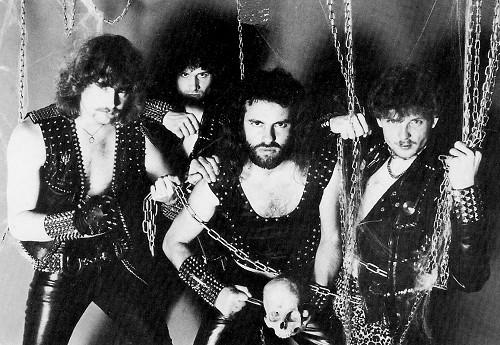 1. Introduction
1. Introduction
2. The Two Faces of the Genre: European and American Power Metal
3. European Power Metal
4. Power Metal of the United States
Introduction
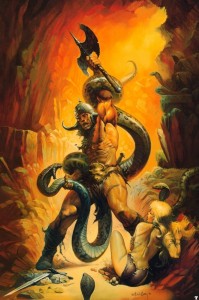
There stood he, on his chariot made of gold
He did reveal the trinity of secrets old.
A sceptre of iron could mercy bring.
A shield of gold, the Creator and king,
And the great sword of steel.
– Manowar, Secret of Steel
It has been asserted that the earliest application of the term ‘power metal’ was the 1982 Metallica demo of that same title; then how exactly has it come to label the fantastic, spirited, even ‘fruity’ kind of music that is currently known as ‘power metal’? Well, the fact of the matter is that the term simply did not catch on with what eventually became the thrash and speed metal genres, whereas the melodic speed metal in Germany (Helloween, Blind Guardian, Running Wild, etc.) developed in the late 1980’s and early 1990’s to coalesce into the genre now popularly known as ‘power metal’. The reason why these bands were labeled differently from their more traditional sounding forerunners was their thematic and musical distinction; these bands dispensed with the darker, ‘doom and gloom’ perspectives of archetypal metal in favour of a much more positive, almost ‘happy’ outlook, and this really came through in the refreshing and inquisitive albums produced in the genre’s youth.
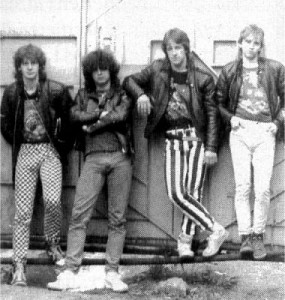 Power metal is something of an enigma in the annals of heavy metal: how does a movement deeply immersed in the fantastic folklore of Europe and beyond, and which borrows openly from Queen and the like, relate at all to the more twisted and obscure worlds of death and black metal? The answer is that the whole genre cannot be measured linearly as you would the passing years; it is to be viewed, rather, as a healthy maple tree, with dozens of branches emerging from the trunk, all headed in different directions but with the same fundamental constitution. Heavy metal represents, after all, a perennial expression of the epic, the tragic, and the victorious, and it would surely be unjust to evoke these eternal artistic truths merely through the medium of the Gothic nightmare, the Lovecraftian dreamscape; power metal exists, therefore, as a keen and adventurous opposite, enabling metal to travel to places impossible in other, darker vehicles.
Power metal is something of an enigma in the annals of heavy metal: how does a movement deeply immersed in the fantastic folklore of Europe and beyond, and which borrows openly from Queen and the like, relate at all to the more twisted and obscure worlds of death and black metal? The answer is that the whole genre cannot be measured linearly as you would the passing years; it is to be viewed, rather, as a healthy maple tree, with dozens of branches emerging from the trunk, all headed in different directions but with the same fundamental constitution. Heavy metal represents, after all, a perennial expression of the epic, the tragic, and the victorious, and it would surely be unjust to evoke these eternal artistic truths merely through the medium of the Gothic nightmare, the Lovecraftian dreamscape; power metal exists, therefore, as a keen and adventurous opposite, enabling metal to travel to places impossible in other, darker vehicles.
The Two Faces of the Genre: European and American Power Metal
While the power metal of Europe is characteristically bright and optimistic on both the lyrical and instrumental fronts, the bands that derive from the United States take on a bit of a different slant; their work is generally darker, and more focused on building upon the foundation started by the NWOBHM, etc., which admittedly makes ‘USPM’ sometimes difficult to distinguish from good old-fashioned ‘heavy metal’. The distinction, however, is an important one, and to help delineate the differences between the genres, we need to recall the common elements that allow us to classify the Europeanbands into ‘power metal’. Sure, there are the basic similarities that are inherited from the same earlier English and German bands, but the crux pf European power metal is its fundamental underlying aim: to illustrate a mythic world (which could very well be our own reality interpreted in an imaginative light) that is at once real and fanciful, and to do so with a generally enthusiastic persuasion. If we are to throw all the European and American bands of the style under the same ‘power metal’ banner, then this intent, this ‘underlying aim’, must be identical in USPM.
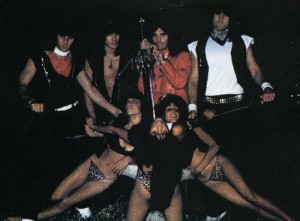 If we consider the early black metal movement from Norway, and how it sought to unearth hidden truths through a dark, mystical aesthetic, we may actually find a parallel to what we mean. While both indubitably desire to ‘illustrate a mythic world at once real and fanciful’, black metal clearly purports to showcase an altogether averse side of that reality when power metal simply means to approach it like a narrative, a folk legend, demonstrating its nature through popular song and poetry. In a kind of microcosm of this, power metal from Europe is the visualization of things of the light, of a dramatic victory of life over death, whereas stateside power metal tends to convey a colder picture of these things: the former focuses on the regal hero, and his conquest over his villains and oppressors, whereas the latter focuses on the villains and the oppressors, and its hero is not so much the Aragorn of Tolkien fame, but Conan the Barbarian rather, a powerful yet lawless ‘antihero’ in the style of Omen’s ‘Axeman’!
If we consider the early black metal movement from Norway, and how it sought to unearth hidden truths through a dark, mystical aesthetic, we may actually find a parallel to what we mean. While both indubitably desire to ‘illustrate a mythic world at once real and fanciful’, black metal clearly purports to showcase an altogether averse side of that reality when power metal simply means to approach it like a narrative, a folk legend, demonstrating its nature through popular song and poetry. In a kind of microcosm of this, power metal from Europe is the visualization of things of the light, of a dramatic victory of life over death, whereas stateside power metal tends to convey a colder picture of these things: the former focuses on the regal hero, and his conquest over his villains and oppressors, whereas the latter focuses on the villains and the oppressors, and its hero is not so much the Aragorn of Tolkien fame, but Conan the Barbarian rather, a powerful yet lawless ‘antihero’ in the style of Omen’s ‘Axeman’!
When the bands from Europe broach whatever subject it is that they wish to express, it will be in a style that is as precise and accurate as as it is dramatic and theatric; the raw power of the music is dropped in favour of an immaculate finesse: this is simply in their nature. As for the Americans, however, a central goal is outlined from the beginning, and the path towards it is narrow but straight and unyielding, concentrated on the living rhythm of the thing rather than on the fine points of its aesthetic and artistic impressions. There may be yet other differences, to be sure, but none of them are more divergent than this simple preference in method; European and power metal are brothers at heart with similar identities and similar intentions. Now, to deliver the best of power metal post-haste!
European Power Metal
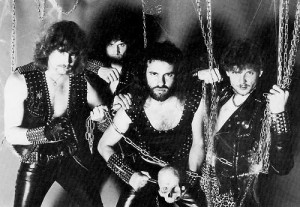 Whenever somebody thinks of power metal, he is likely thinking of the particularly dramatic style growing out of Europe, unless it is the popular barbarians in Manowar; indeed, Helloween’s ‘Keeper of the Seven Keys’ albums, Blind Guardian’s ‘Tales from the Twilight World’, and Rage’s ‘Secrets in a Weird World’ are veritable classics of the type. The music itself is, generally speaking, a sort of joyous hybrid consisting of Iron Maiden, thrash metal, and J.R.R. Tolkien, and is ultimately united by a strong sense of adventure and myth as is evinced by the themes widely explored by virtually every band involved in the scene. So, a taste for speedy rhythms, confessedly goofy, ‘cheesy’ lyrics, and plenty of high-calibre guitar solos is pretty much mandatory for anyone who wants to walk in the footsteps of the following albums…
Whenever somebody thinks of power metal, he is likely thinking of the particularly dramatic style growing out of Europe, unless it is the popular barbarians in Manowar; indeed, Helloween’s ‘Keeper of the Seven Keys’ albums, Blind Guardian’s ‘Tales from the Twilight World’, and Rage’s ‘Secrets in a Weird World’ are veritable classics of the type. The music itself is, generally speaking, a sort of joyous hybrid consisting of Iron Maiden, thrash metal, and J.R.R. Tolkien, and is ultimately united by a strong sense of adventure and myth as is evinced by the themes widely explored by virtually every band involved in the scene. So, a taste for speedy rhythms, confessedly goofy, ‘cheesy’ lyrics, and plenty of high-calibre guitar solos is pretty much mandatory for anyone who wants to walk in the footsteps of the following albums…
Blind Guardian “Nightfall in Middle-earth”
In a word: What would Tolkien say?
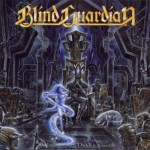 As far as rankings go, this is the only album that is absolutely set in stone on this entire list. ‘Nightfall in Middle-earth’ is the ascendant apex of power metal; it is the crystallized embodiment of the genre’s ideal. The reason for offering such profound adulation really comes down to the band’s ability to transcend the limits of power metal whilst playing within them; they have nailed the ‘folky’, popular element of music with a peculiar ingenuity that comprehensively impresses upon the basic musical format of the genre; in other words, Blind Guardian has done for power metal what Johannes Brahms had done for Romantic music with his ‘Hungarian Dances’.
As far as rankings go, this is the only album that is absolutely set in stone on this entire list. ‘Nightfall in Middle-earth’ is the ascendant apex of power metal; it is the crystallized embodiment of the genre’s ideal. The reason for offering such profound adulation really comes down to the band’s ability to transcend the limits of power metal whilst playing within them; they have nailed the ‘folky’, popular element of music with a peculiar ingenuity that comprehensively impresses upon the basic musical format of the genre; in other words, Blind Guardian has done for power metal what Johannes Brahms had done for Romantic music with his ‘Hungarian Dances’.
In narrating a large portion of Tolkien’s most ‘historical’ epic, The Silmarillion, Blind Guardian succeeds in demonstrating the raw power of a living mythos and a visceral pathos, as well as the simple wonders of storytelling, through a dynamic interplay between a tight rhythm section and an innovative mastery of the axe that Herr Ohlbrich presents for us, the audience; and the vocals of Hansi Kuersch, the real conduit of the myth’s passion, are never better, cutting through the music with a certain feeling that conveys the appropriate emotion, the appropriate strength needed to evoke the right imagery. ‘Nightfall in Middle-earth’ is an independent artistic monument: it is not a mere ‘ode to Tolkien’, or some such tribute, but a fully accomplished string of songs that successfully brings the majesty of Tolkien’s mythic world to the equally wonderful world of metal.
Helloween “The Keeper of the Seven Keys” Pt. I & II
In a word: The epitome of power metal
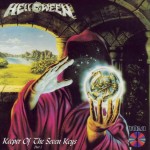 It is an indisputable fact that Helloween is no less than the very quintessence of power metal; from the triumphant ‘Initiation’ to the epic climax of the title track in Pt. II, there is nothing that escapes the boundaries, nothing that does not inherently belong in what the genre has come to mean. The outstanding evidence for this thesis can be found, as vague as it may sound, in the general spirit of the music: there is an excited, joyous pitch that pervades every aspect of the albums, and it draws the listener into the music, attempting to transport this transcendent gladness unto him. This is musically accomplished through a fast, upbeat rhythm, quick and virile riffs and solos, and of course through rich, charming vocals of Michael Kiske that are at once evocative and powerful.
It is an indisputable fact that Helloween is no less than the very quintessence of power metal; from the triumphant ‘Initiation’ to the epic climax of the title track in Pt. II, there is nothing that escapes the boundaries, nothing that does not inherently belong in what the genre has come to mean. The outstanding evidence for this thesis can be found, as vague as it may sound, in the general spirit of the music: there is an excited, joyous pitch that pervades every aspect of the albums, and it draws the listener into the music, attempting to transport this transcendent gladness unto him. This is musically accomplished through a fast, upbeat rhythm, quick and virile riffs and solos, and of course through rich, charming vocals of Michael Kiske that are at once evocative and powerful.
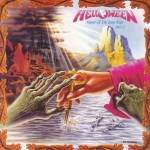 Beyond the individual components, however, Helloween is a band that brought to metal not only a new and positive way of playing, but also a more or less original perspective on metal: they have come here in good humour, to have fun, and to never take life more seriously than it has to be. The final effect of all this is a pair of albums that are perhaps the most widely imitated in the entire genre, and the real cause of this is obvious: nowhere is the singular idea of power metal more manifest, more alive, and more euphoric than in ‘The Keeper of the Seven Keys’.
Beyond the individual components, however, Helloween is a band that brought to metal not only a new and positive way of playing, but also a more or less original perspective on metal: they have come here in good humour, to have fun, and to never take life more seriously than it has to be. The final effect of all this is a pair of albums that are perhaps the most widely imitated in the entire genre, and the real cause of this is obvious: nowhere is the singular idea of power metal more manifest, more alive, and more euphoric than in ‘The Keeper of the Seven Keys’.
Gamma Ray “Land of the Free”
In a word: Helloween reborn
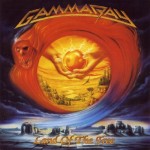 With original Helloween visionary Kai Hansen at the helm, Gamma Ray can and should be perceived as the true heir to the ‘Keeper’ albums of the late eighties – building off of a passionate drive forward on all instruments, and with Hansen’s emphatic vocals in firm control, all of the basic ingredients that conspired to make Helloween what it is are fully intact. What makes Gamma Ray so important, however, is that its creation of ‘Land of the Free’ ends nearly a decade of sterility from the Helloween camp; Gamma Ray has effectively resurrected the original spirit that caused the birth of so many clones.
With original Helloween visionary Kai Hansen at the helm, Gamma Ray can and should be perceived as the true heir to the ‘Keeper’ albums of the late eighties – building off of a passionate drive forward on all instruments, and with Hansen’s emphatic vocals in firm control, all of the basic ingredients that conspired to make Helloween what it is are fully intact. What makes Gamma Ray so important, however, is that its creation of ‘Land of the Free’ ends nearly a decade of sterility from the Helloween camp; Gamma Ray has effectively resurrected the original spirit that caused the birth of so many clones.
As for the album itself, there is a sincere approach to the songwriting; there is a definite connection between all parts to form a good, coherent song; the riffs are brighter, more focused and vibrant, whereas the percussion lays a strong, fertile foundation for every melody, every chorus; in short, the masters reveal in ‘Land of the Free’ how to really invoke the mad and happy spirits of power metal. Interestingly, in an event that is based more in fact than in coincidence or irony, ‘Land of the Free’, at 1996, was released right before the resurgent waves of power metal took shape at the end of the nineties, just like the ‘Keeper’ albums in the twilight of the eighties…
Lost Horizon “Awakening the World”
In a word: Death metal turned upside down
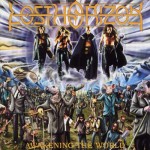 Assembled from the remains of the death metal band Luciferion, Sweden’s Lost Horizon apply its former Satanic autonomy and egoistic ambitions to a new, far more personal mode of free will and individual freedom and power. Energetic and motivated, ‘Awakening the World’ moves quickly, showcasing a fluent sense of songwriting and technique that gladly transcends the sterile plains and generic conventions of recent power metal. The players have a strong taste for the old-school, and yet their collective synergy, with a special mention to the tireless guitars, which provide a seemingly inexhaustible supply of clever hooks and passionate leads, is wholly innovative in its united vision and dynamic execution; this makes for a convincing display of refreshing songcraft, which in turn injects something original and commanding into the old-school template; in summary, the legendary Helloween undergoes yet further renovations, and is re-invigorated into one of the few leading warriors of modern power metal. Indeed, excluding the few pointless ‘minitracks’ found on the record, ‘Awakening the World’, with all of its vigour and spirited determination, is the perfect testament to the full extent and capability of the independent human will.
Assembled from the remains of the death metal band Luciferion, Sweden’s Lost Horizon apply its former Satanic autonomy and egoistic ambitions to a new, far more personal mode of free will and individual freedom and power. Energetic and motivated, ‘Awakening the World’ moves quickly, showcasing a fluent sense of songwriting and technique that gladly transcends the sterile plains and generic conventions of recent power metal. The players have a strong taste for the old-school, and yet their collective synergy, with a special mention to the tireless guitars, which provide a seemingly inexhaustible supply of clever hooks and passionate leads, is wholly innovative in its united vision and dynamic execution; this makes for a convincing display of refreshing songcraft, which in turn injects something original and commanding into the old-school template; in summary, the legendary Helloween undergoes yet further renovations, and is re-invigorated into one of the few leading warriors of modern power metal. Indeed, excluding the few pointless ‘minitracks’ found on the record, ‘Awakening the World’, with all of its vigour and spirited determination, is the perfect testament to the full extent and capability of the independent human will.
Blind Guardian “Tales from the Twilight World”
In a word: Only Blind Guardian could merit such blatant disregard for the rules
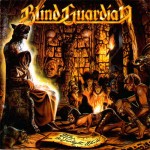 Having released two speed metal classics in ‘Battalions of Fear’ and ‘Follow the Blind’ just prior to this record, Blind Guardian were ready to move firmly into the nascent realm of power metal. Rather than dropping all established identity in their process of growth, however, the guys from Krefeld, Germany initiate a deep melodic shift into the existent speed metal basis, allowing a subtle change to make a significant effect on the overall sound. The result is a more focused, more defined direction than what the two previous efforts had known; in addition to a lyrical and mythological construction that builds on what they had already started, albeit primitively, this meant that ‘Tales from the Twilight World’ became the first real power metal album that Blind Guardian would create.
Having released two speed metal classics in ‘Battalions of Fear’ and ‘Follow the Blind’ just prior to this record, Blind Guardian were ready to move firmly into the nascent realm of power metal. Rather than dropping all established identity in their process of growth, however, the guys from Krefeld, Germany initiate a deep melodic shift into the existent speed metal basis, allowing a subtle change to make a significant effect on the overall sound. The result is a more focused, more defined direction than what the two previous efforts had known; in addition to a lyrical and mythological construction that builds on what they had already started, albeit primitively, this meant that ‘Tales from the Twilight World’ became the first real power metal album that Blind Guardian would create.
Angra “Temple of Shadows”
In a word: Fresh, unique, articulate
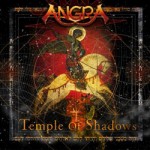 It is certainly not an oversight of ours to include a Brazilian band in a list of allegedly European acts, but it certainly would be an oversight on anyone’s part to exclude Angra for that fact alone; indeed, Angra actually exemplify the strictly European style, often much more so than its intercontinental counterparts. On this particular album, ‘Temple of Shadows’, we believe that Angra hit its creative peak, even without Andre Matos, the legendary songwriter who had such a profound effect on their earlier records.
It is certainly not an oversight of ours to include a Brazilian band in a list of allegedly European acts, but it certainly would be an oversight on anyone’s part to exclude Angra for that fact alone; indeed, Angra actually exemplify the strictly European style, often much more so than its intercontinental counterparts. On this particular album, ‘Temple of Shadows’, we believe that Angra hit its creative peak, even without Andre Matos, the legendary songwriter who had such a profound effect on their earlier records.
Angra has always been about fusing the flashy and melodic speed of early power metal with an accurate and concise technical performance arrayed in a way that many have termed ‘progressive’; this is no different on the present album, where speed and ‘progressivisms’ take on appropriately supplementary roles, allowing the melodies to embrace centre stage, and, apart from the occasional yet needless sentimental moment, they excel in the spotlight. With a concentrated, coherent method of songwriting, not to mention the impressive technical prowess of either axe, the melodic leads and solos are certain highlights of every song and, combined with a strong, classic understanding of the chorus and its importance, they are both literally and figuratively instrumental in making ‘Temple of Shadows’ a modern power metal classic.
Running Wild “Black Hand Inn”
In a word: Iron Maiden meets Accept meets Captain Blackbeard meets six bottles of rum
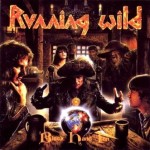 A typical occurrence in the development of any which power metal band is an attachment to some particular image or identity that is somewhat removed from ‘ordinary life’. So, in addition to faeries, elves and dragons of Italian symphonic bands like Rhapsody, we have Blind Guardian paying particular homage to the worlds of J.R.R. Tolkien; Grave Digger unearthing the historical remains of old, forgotten battles; and Running Wild, a band that was evidently dissatisfied with singing about the devil and had moved on to pirates instead.
A typical occurrence in the development of any which power metal band is an attachment to some particular image or identity that is somewhat removed from ‘ordinary life’. So, in addition to faeries, elves and dragons of Italian symphonic bands like Rhapsody, we have Blind Guardian paying particular homage to the worlds of J.R.R. Tolkien; Grave Digger unearthing the historical remains of old, forgotten battles; and Running Wild, a band that was evidently dissatisfied with singing about the devil and had moved on to pirates instead.
There is not really a substantive or profound depth that drives the music onwards; this is simply a band that lures the listener in with the promise of a fun, exciting story about pirates (which is of course told by a drunk), and then promptly barrages him with easy, carousing rhythms that are inevitably met by a strong, anthemic chorus. Iron Maiden make their presence known on this record through the occasional galloping riff, as well as the many guitar harmonies, whereas the Running Wild anthem is unmistakably imbued with the infectious talents of their fellow Germans, Accept. Altogether, the band’s vision is not any higher than what many contemporary ‘folk metal’ bands attempt; namely, to create inebriated, party music. The difference is that, with their reliance on the well-tested techniques of bands like Iron Maiden, Accept, and Helloween, and with a perfectly suitable theme that can rouse any prole to drink, these Teutonic pirates actually succeed where the faux-vikings fail dismally.
Pagan’s Mind “Celestial Entrance”
In a word: Symphony X done right
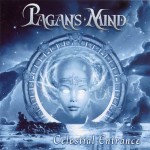 While Pagan’s Mind is often referred to as ‘progressive metal’, we happen to think of its work as being far more along the lines of modern power metal, which is mainly due its focus on drafting songs that emphasize the traditional melody and rhythm combination, as opposed to whatever it is that actually constitutes the average Dream Theater album; when Jorn Lofstad launches into a solo, we can safely wager that it will not be prolonged into the pretentious affair of noodling for half an hour a la John Petrucci.
While Pagan’s Mind is often referred to as ‘progressive metal’, we happen to think of its work as being far more along the lines of modern power metal, which is mainly due its focus on drafting songs that emphasize the traditional melody and rhythm combination, as opposed to whatever it is that actually constitutes the average Dream Theater album; when Jorn Lofstad launches into a solo, we can safely wager that it will not be prolonged into the pretentious affair of noodling for half an hour a la John Petrucci.
This is a good album because the band has (1) a firm grounding in the basics of what makes metal what it is; and (2) because they have just enough impetus to advance: where others might founder in the sterile waters of mediocrity, Pagan’s Mind actually manipulate its excellent instrumentation into well-structured compositions that reflect a band that clearly knows what it wants to achieve, and accordingly goes out and achieves it. So, through a strong sense of rhythm and a penchant for the dramatic, Pagan’s Mind combines the intricate work of a clever, flashy guitarist, the reliable rhythm section, with a typically illustrious vocalist to construct Celestial Entrance, an album that sounds precisely what its title implies: the epic adventure into the astral spheres.
Power Metal of the United States
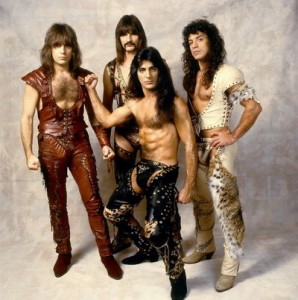 It can be argued that while the charismatic and often operatic vocals lead the advance for the European bands, it is the powerof the simple yet efficient riff that drives the American bands forward. Indeed, the feeling of an honest, ‘blue-collar’ sentiment pervades many of the more emblematic records of this kind, and it does not get any more present than in an old-school technique of guitar playing; nothing fancy, nothing extra, it just gets the job done. This does not in any way blunt the efforts of these bands as they endeavour to create something epic, something that can even be called ‘mythological’ by the standards of our day; on the contrary, the stripped-down sound of many early albums helps produce the effect of being of modest birth, which allows them to be classified as ‘popular’ and even ‘folky’, the proper requirements of any nascent myth. Finally, to cite the execution of these theories, we give to you nine of the best USPM albums extant… (We have given the Americans an extra album due to their superiority in the sheer quantity of good power metal albums released over the years.)
It can be argued that while the charismatic and often operatic vocals lead the advance for the European bands, it is the powerof the simple yet efficient riff that drives the American bands forward. Indeed, the feeling of an honest, ‘blue-collar’ sentiment pervades many of the more emblematic records of this kind, and it does not get any more present than in an old-school technique of guitar playing; nothing fancy, nothing extra, it just gets the job done. This does not in any way blunt the efforts of these bands as they endeavour to create something epic, something that can even be called ‘mythological’ by the standards of our day; on the contrary, the stripped-down sound of many early albums helps produce the effect of being of modest birth, which allows them to be classified as ‘popular’ and even ‘folky’, the proper requirements of any nascent myth. Finally, to cite the execution of these theories, we give to you nine of the best USPM albums extant… (We have given the Americans an extra album due to their superiority in the sheer quantity of good power metal albums released over the years.)
Manowar “Into Glory Ride”
In a word: Comprehensively feudal
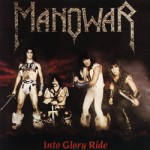 When it comes to picking the best Manowar album, any one of the first four would be a respectable choice; every which one is a proud testament to band’s core spirit, to the band’s purely honest will to play the kind of metal that is more barbaric than civilized, more feral than cultivated. ‘Into Glory Ride’ strikes a particularly powerful chord for us, however, and this is as much due to its consistency as its extra concentration on the epic narrative, which is constructed in an almost ‘cartoonish’ tribute to metal and to death.
When it comes to picking the best Manowar album, any one of the first four would be a respectable choice; every which one is a proud testament to band’s core spirit, to the band’s purely honest will to play the kind of metal that is more barbaric than civilized, more feral than cultivated. ‘Into Glory Ride’ strikes a particularly powerful chord for us, however, and this is as much due to its consistency as its extra concentration on the epic narrative, which is constructed in an almost ‘cartoonish’ tribute to metal and to death.
The music is simple, written to the effect of a moving rhythm and a rousing anthem; the corresponding lyrics are more charming and pompous than they are cheesy, and they are essential in creating a medieval atmosphere of outlaws the ‘anything-goes’ attitude of the Wild West. The best reason for this band to receive the highest rank, however, is not merely for its flawless presentation of an honest yet primitive idea, but for how direct and how iconic this idea has become in its fullest execution: Manowar truly represents the fundamental vision of American power metal.
Iced Earth “Burnt Offerings”
In a word: An honest monument to the memory of Dante’s Inferno
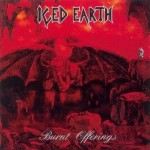 In contrast with virtually every other featured in these lists, ‘Burnt Offerings’ evinces a conscious effort on the part of the songwriters to something darkly malignant, something sinister. Although firmly rooted in the melodic tradition of Iron Maiden, this album is steeped in the Faustian temptation to explore the infernal plains, to pursue the flame of self-discovery. This nefarious vision is revealed not only through the thematically relevant lyrics that cover everything from tragic love to Dante’s Inferno, but more importantly through the music itself: the guitars in particular exude a deep and molten darkness, providing profound and often chilling melodies as well as a layered rhythm that either gallops forth rapidly, or marches on slowly in a mystical calm not far removed from that of many doom metal acts. The dynamic vocals of Matt Barlow are at once dramatic, powerful, and are perfectly eloquent in conveying the appropriate emotion, especially of sadness and of wrath; the percussion, on the other hand, is straight-forward and simplistic, which is all that is needed to contribute to the pulsing, imperial rhythm. All of this is assembled and passed through an abyssal, velvet production that infuses the music with an invaluable sense of enduring darkness.
In contrast with virtually every other featured in these lists, ‘Burnt Offerings’ evinces a conscious effort on the part of the songwriters to something darkly malignant, something sinister. Although firmly rooted in the melodic tradition of Iron Maiden, this album is steeped in the Faustian temptation to explore the infernal plains, to pursue the flame of self-discovery. This nefarious vision is revealed not only through the thematically relevant lyrics that cover everything from tragic love to Dante’s Inferno, but more importantly through the music itself: the guitars in particular exude a deep and molten darkness, providing profound and often chilling melodies as well as a layered rhythm that either gallops forth rapidly, or marches on slowly in a mystical calm not far removed from that of many doom metal acts. The dynamic vocals of Matt Barlow are at once dramatic, powerful, and are perfectly eloquent in conveying the appropriate emotion, especially of sadness and of wrath; the percussion, on the other hand, is straight-forward and simplistic, which is all that is needed to contribute to the pulsing, imperial rhythm. All of this is assembled and passed through an abyssal, velvet production that infuses the music with an invaluable sense of enduring darkness.
‘Burnt Offerings’ is really about an inverted heroism, a nocturnal pathos that gasps dryly and thrashes uncontrollably in the unfathomable depths; it is the musical monument to Satan’s legion as summoned by John Milton in the 17th Century. Where other American bands of this style commonly create something revolving around ‘practical reality’, Iced Earth is instead inspired to invoke an album that is crafted in the genuinely artistic sense, which enables ‘Burnt Offerings’ to really draw out its genuinely artistic qualities, which include but are not limited to its potent aesthetical romanticism, its fiery rebellion of a righteous condemnation, and finally its paradoxical delight in striving for the impossible.
Sanctuary “Into the Mirror Black”
In a word: Rhythmic power as opposed to moronic groove
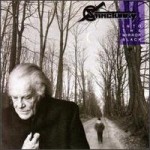 Just before the stifling effect of the grunge scene overwhelmed the Seattle area, there was still a band that truly believed in the basics of heavy metal: Sanctuary. ‘Into the Mirror Black’ is the second of two quality albums made by a band that really epitomizes American power metal: heavy and forward riffs planted in a traditional format of composition, clear and stylized vocals, and lyrics that directly relate to practical reality and human emotion.
Just before the stifling effect of the grunge scene overwhelmed the Seattle area, there was still a band that truly believed in the basics of heavy metal: Sanctuary. ‘Into the Mirror Black’ is the second of two quality albums made by a band that really epitomizes American power metal: heavy and forward riffs planted in a traditional format of composition, clear and stylized vocals, and lyrics that directly relate to practical reality and human emotion.
In Sanctuary’s case, the lyrics are particularly philosophic and investigative; they deliberately seek out the answers of some of the more obscure questions, and employ the technique of asking their own questions to the desired effect of placing emphasis where emphasis is needed. There is an almost poetic meter to the way that the lyrics are stressed, a rhythmic harmony that is evenly matched with an intelligent creation of riffs that accord with the meter of any which verse. This is important to remark upon not only because one of the key aims of this record is the exposition of several lyrical themes, but mostly because ‘Into the Mirror Black’ is built fundamentally around rhythm, and this particular sense of rhythm is not so much manufactured through the percussion and bass as it is by the guitars and vocals. So, yes, of course there are the lightning solos, the pounding battery and the occasional melody, but far more essential than all of this is the bold, relentless rhythm to which all else is subservient.
Crimson Glory “Crimson Glory”
In a word: Romanticism as Mary Shelley knew it
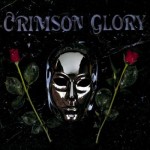 In the typical metal band, there is likely an emphasis on something, a particular area in which the band excels; we can mention that Slayer, for instance, was exceptional in pacing forward at a speed that few could immediately handle; or we can mention that Bathory was brilliant in evoking simple but dreadful subjects through simple but abrasive songwriting, and somehow being all the more fearsome for it. In this vein, Crimson Glory is excellent at putting together a song that subsists, indeed thrives on its melodic intuition: without that keen, delicate pulling of the strings, without the subtle taste in melancholy, everything would disintegrate.
In the typical metal band, there is likely an emphasis on something, a particular area in which the band excels; we can mention that Slayer, for instance, was exceptional in pacing forward at a speed that few could immediately handle; or we can mention that Bathory was brilliant in evoking simple but dreadful subjects through simple but abrasive songwriting, and somehow being all the more fearsome for it. In this vein, Crimson Glory is excellent at putting together a song that subsists, indeed thrives on its melodic intuition: without that keen, delicate pulling of the strings, without the subtle taste in melancholy, everything would disintegrate.
All aspects of Crimson Glory, from the dramatic introductions to the starry chorus, from each sad rhythm to every slender, passionate solo, all of it depends on this fully pervasive emphasis on melody. The reason for this has already been hinted at: ‘Crimson Glory’ is a tragic album. Melody is seldom more useful than in conveying a deep and immutable sadness; the notes, while sufficient in number to prevent an outright dirge, are usually slower, downcast, hopelessly inflected by that precious melancholy sought by every romantic poet. While this album is obviously not overtly tragic, its subtleties are more than enough to allow us a glimpse of its true pathetic nature; indeed, its character is not really like that of the despondent misanthrope who cannot view life without seeing death as well, but more like that of a patient lover, the lover who is momentarily divorced from his opposite and yet at heart knows and feels that she is destined to return.
Manilla Road “Open the Gates”
In a word: A legendary band in the right circles
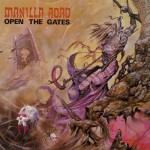 Manilla Road released several cult albums that have become essential to the traditional and power metal genres. ‘Open the Gates’, like sister records ‘ Crystal Logic’ and ‘The Deluge’, utilizes a low, throaty production that conveys their unique guitar and vocal sounds in the rough and hardened way that best suits the fundaments of classic Manilla Road. The axework resembles something sanguine and archaic: an image of an army of rusting skeletal soldiers is evoked by the creaking riffs that rumble over the heated rocks of the battlefield, as well as by the elongated solos that twist and turn in no predictable pattern until the tracks’ climax and descent is fulfilled. The music establishes the appropriate imagery for what the collective imagination of the band envisions: wide, perilous landscapes marked by the comings and goings of dread legions and tyrannical dragons; the colour scheme pervading the artistic schema is a vivid and unmistakable red in the likeness of a fast and ageless fire.
Manilla Road released several cult albums that have become essential to the traditional and power metal genres. ‘Open the Gates’, like sister records ‘ Crystal Logic’ and ‘The Deluge’, utilizes a low, throaty production that conveys their unique guitar and vocal sounds in the rough and hardened way that best suits the fundaments of classic Manilla Road. The axework resembles something sanguine and archaic: an image of an army of rusting skeletal soldiers is evoked by the creaking riffs that rumble over the heated rocks of the battlefield, as well as by the elongated solos that twist and turn in no predictable pattern until the tracks’ climax and descent is fulfilled. The music establishes the appropriate imagery for what the collective imagination of the band envisions: wide, perilous landscapes marked by the comings and goings of dread legions and tyrannical dragons; the colour scheme pervading the artistic schema is a vivid and unmistakable red in the likeness of a fast and ageless fire.
Nestled in the gentle plains of Kansas, Manilla Road has established a firm foothold in the annals of heavy metal with the attainment of an identity that is entirely its own; even with the most modest of song structures, ‘Open the Gates’ is successful in its ambition to recreate a fiery, mythic world through a dramatic and persuasive vocalist, destructive and bloody riffing, and that ever persistent struggle to perceive and grasp the Epic, the richest content in every story.
Savatage “Hall of the Mountain King”
In a word: Let the curtains fall
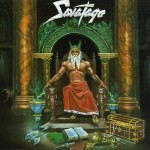 There has always been something purposefully theatrical about Savatage – the sense that the band is putting on some poignant story between the curtains is never absent in any Savatage album. Before Jon Oliva remembered his Italian roots and emphasized the story over the metal, he was deeply involved with an album that is actually more metal than it is melodramatic. The musicianship in ‘Hall of the Mountain King’ is fairly intricate and developed, although Jon’s brother Criss is rarely shy of occasionally firing in a simply, catchy riff; on the whole, however, the music is classy and orchestrated by a general motif revolving around that old art of telling tales the Italian way.
There has always been something purposefully theatrical about Savatage – the sense that the band is putting on some poignant story between the curtains is never absent in any Savatage album. Before Jon Oliva remembered his Italian roots and emphasized the story over the metal, he was deeply involved with an album that is actually more metal than it is melodramatic. The musicianship in ‘Hall of the Mountain King’ is fairly intricate and developed, although Jon’s brother Criss is rarely shy of occasionally firing in a simply, catchy riff; on the whole, however, the music is classy and orchestrated by a general motif revolving around that old art of telling tales the Italian way.
It might well appear that Savatage is not really of the American type of power metal; this is true to an extent, since these New Yorkers definitely focus on a neat and theatrical presentation of an appropriate theme; it is equally true that the music certainly comes across as Classically inspired, even going so far as to include a metal rendition of Grieg’s legendary ‘In der Halle des Bergkoenigs’. Beyond all of this, however, there is a peculiar, indefinable ‘dirtiness’ which is indisputably American by nature that infiltrates all aspects of Savatage; from Jon’s gritty vocals to Criss’s riffs and reckless solos, the bold advance of the Yankee puts its taint on a seemingly neoclassical, a seemingly European band.
Omen “Battle Cry”
In a word: Just look at any track title…
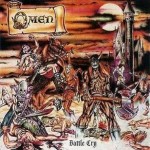 Beyond the justice and the caprice of society, beyond the state of sedentary existence, the law of the lawless rules unchallenged. Omen immediately brings to mind two possible landscapes: the first is of an exiled band of brigands and strongmen, fighting whomever for food, fun, or coin; the second is of a post-apocalyptic world similar to the dystopia of Snake Plisskin fame. In the end, however, the sights, smells, and noises of any age are irrelevant, for the fundamental idea that this album conveys is a timeless one: the barbarian, the ‘law unto oneself’ ideal of savages everywhere; it is unquestionably the focal point of this highly direct and uncompromising album.
Beyond the justice and the caprice of society, beyond the state of sedentary existence, the law of the lawless rules unchallenged. Omen immediately brings to mind two possible landscapes: the first is of an exiled band of brigands and strongmen, fighting whomever for food, fun, or coin; the second is of a post-apocalyptic world similar to the dystopia of Snake Plisskin fame. In the end, however, the sights, smells, and noises of any age are irrelevant, for the fundamental idea that this album conveys is a timeless one: the barbarian, the ‘law unto oneself’ ideal of savages everywhere; it is unquestionably the focal point of this highly direct and uncompromising album.
The music is equally straightforward; quick yet still mid-paced verse sections are clearly rhythmic, nothing extraneous whatsoever; the chorus is typically anthemic, beckoning the listener to join in this gladiatorial brawl, or at least to sing along. However simple this album comes across as, it does not suffer anything by it, for really its execution of the perennial imagery of fighting outlaws is efficient and apt; after all, one can hardly expect or even imagine any band to arrange a full, technically adept orchestral composition to record the legends of a Conan or a Mad Max.
Hammers of Misfortune “The Bastard”
In a word: Mystical legends as told by a Satyr
 While Mike Scalzi may be more renowned for his work in The Lord Weird Slough Feg, a band supposed to be at the forefront of a resurgence in traditional metal, we find that his more interesting project is undoubtedly Hammers of Misfortune. An outstanding reason for this assertion is that hammers is a novel production, a band that provides us with a much needed new perspective on heavy, trad, power, whatever kind of metal that this album actually falls into; ‘The Bastard’ is refreshing for this alliance of multiple concordant elements, for its eclectic understanding of musical creation.
While Mike Scalzi may be more renowned for his work in The Lord Weird Slough Feg, a band supposed to be at the forefront of a resurgence in traditional metal, we find that his more interesting project is undoubtedly Hammers of Misfortune. An outstanding reason for this assertion is that hammers is a novel production, a band that provides us with a much needed new perspective on heavy, trad, power, whatever kind of metal that this album actually falls into; ‘The Bastard’ is refreshing for this alliance of multiple concordant elements, for its eclectic understanding of musical creation.
The vocals, consisting of both male and female, both clean and bestial, are at the crux of the record, giving the unique story behind it an appropriately dramatic, even thespian approach: each voice seems to resemble either a character involved in the concept or an aloof narrator. The riffing is similarly diverse: the guitars flow easily, albeit in irregular patterns, curling and bending through each phrase, allowing an almost serpentine atmosphere to materialize; this does not, however, restrict the players from constructing rather inspiring melodic passages, or from submitting a low and swaying rhythm. ‘The Bastard’, for all its eccentricity and deviations from what we might call ‘normal songwriting’, is still an album with a resolute identity; in both lyrical and strictly musical content, Hammers of Misfortune is yet another metal band that invokes the spirit of a folky, medieval tradition to create a folky, medieval album.
Cirith Ungol “King of the Dead”
In a word: Where doom metal and fantasy collide
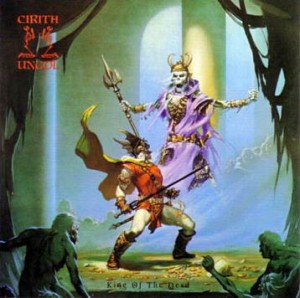 ‘King of the Dead’ is one of those albums that defy any single classification: it is not only doom, it is not only power, and it is certainly not at all NWOBHM. There is, however, a single band that can be distinguished above all others in terms of influence: that band is Black Sabbath. While many of Cirith Ungol’s defining characteristics are fairly different from those of ’Sabbath, the traits in guitar wizardry are more or less identical; the movement of the song is wholly dependent on these slow, rumbling, repetitive riffs that crawl on and on; the song builds up into a zenith a behemoth of strength, powered by these simple, dreadful riffs that never relent. The vocals, on the other hand, are unique and virtuosic; Tim Baker’s voice is a mild shriek, as it were, a high-pitch, high-volume rasp.
‘King of the Dead’ is one of those albums that defy any single classification: it is not only doom, it is not only power, and it is certainly not at all NWOBHM. There is, however, a single band that can be distinguished above all others in terms of influence: that band is Black Sabbath. While many of Cirith Ungol’s defining characteristics are fairly different from those of ’Sabbath, the traits in guitar wizardry are more or less identical; the movement of the song is wholly dependent on these slow, rumbling, repetitive riffs that crawl on and on; the song builds up into a zenith a behemoth of strength, powered by these simple, dreadful riffs that never relent. The vocals, on the other hand, are unique and virtuosic; Tim Baker’s voice is a mild shriek, as it were, a high-pitch, high-volume rasp.
The overall sum of the parts is a skeletal aesthetic that complies with the overt motif of Tolkien’s ghostly legion, which is of course ruled by the king of the dead. The black, crumbling riffs partnered with the neat, scratching solos depict a horrible chamber whilst the uncomfortable vocals unleash the eternal anguish of its prisoners. The name of the band and of this album really epitomizes the nature of both: Cirith Ungol is not content to simply look through the Lord of the Rings and be amazed at the immortal elves, or to stand in awe of a defiant, manly heroism; infact, Cirith Ungol will never be content until every proud and noble city is the lair of maggots and goblin filth, until every tall man is made short and swarthy due to some dark hubris; indeed, Cirith Ungol will never be content until every path, every secret passage becomes the private hunting ground of wild and wicked spiders.
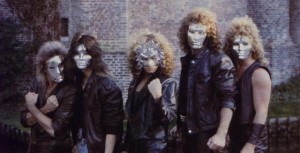
In the sky a mighty eagle
Doesn’t care about what’s illegal
On its wings the rainbow’s light
It’s flying to eternity
– Helloween, Eagle Fly Free
Written by Xavier
Tags: angra, Awakening the World, Battle Cry, Black Hand Inn, blind guardian, Burnt Offerings, Celestial Entrance, cirith ungol, Crimson Glory, Gamma Ray, genre, Hall of the Mountain King, Hammers of Misfortune, Heavy Metal, helloween, iced earth, Into Glory Ride, Into the Mirror Black, King of the Dead, Land of the Free, Lost Horizon, manilla road, manowar, Nightfall in Middle-Earth, Omen, Open the Gates, Pagan's Mind, power metal, Running Wild, sanctuary, Savatage, Speed Metal, Tales from the Twilight World, Temple of Shadows, The Bastard, The Keeper of the Seven Keys, zine-zines

